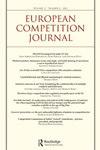反竞争自我偏好的未来——《TFEU》第102条下语音助手的超推行为分析
Q2 Social Sciences
引用次数: 0
摘要
摘要随着语音智能行业的兴起,消费者参与度也在不断提高。从鼠标“点击”或屏幕“触摸”导航数字环境到“语音命令”的预期转变,为数字平台成为基于语音的服务的领导者奠定了基础。委员会对消费者物联网行业的调查显示,通用语音助理市场的发展由少数几家大型科技公司牵头,突显了人们对这些市场竞争性和日益集中的担忧。这一贡献表明,语音助手处于独特的地位,可以参与消费者对市场结果的动态个性化指导——超推动。它通过《TFEU》第102条规定的禁止滥用支配地位的视角来审视语音助手的超推行为,表明超推等先进的用户影响力可能成为参与更微妙的反竞争自我偏好的工具。本文章由计算机程序翻译,如有差异,请以英文原文为准。
The future of anticompetitive self-preferencing: analysis of hypernudging by voice assistants under article 102 TFEU
ABSTRACT With the nascent rise of the voice intelligence industry, consumer engagement is evolving. The expected shift from navigating digital environments by a “click” of a mouse or a “touch” of a screen to “voice commands” has set digital platforms for a race to become leaders in voice-based services. The Commission's inquiry into the consumer IoT sector revealed that the development of the market for general-purpose voice assistants is spearheaded by a handful of big technology companies, highlighting the concerns over the contestability and growing concentration in these markets. This contribution posits that voice assistants are uniquely positioned to engage in dynamically personalized steering – hypernudging – of consumers toward market outcomes. It examines hypernudging by voice assistants through the lens of abuse of dominance prohibition enshrined in article 102 TFEU, showcasing that advanced user influencing, such as hypernudging, could become a vehicle for engaging in a more subtle anticompetitive self-preferencing.
求助全文
通过发布文献求助,成功后即可免费获取论文全文。
去求助
来源期刊

European Competition Journal
Social Sciences-Law
CiteScore
1.50
自引率
0.00%
发文量
12
期刊介绍:
The European Competition Journal publishes outstanding scholarly articles relating to European competition law and economics. Its mission is to help foster learning and debate about how European competition law and policy can continue to develop in an economically rational way. Articles published in the Journal are subject to rigorous peer review by leading experts from around Europe. Topics include: -Vertical and Conglomerate Mergers -Enlargement of the Union - the ramifications for Competition Policy -Unilateral and Coordinated Effects in Merger Control -Modernisation of European Competition law -Cartels and Leniency.
 求助内容:
求助内容: 应助结果提醒方式:
应助结果提醒方式:


